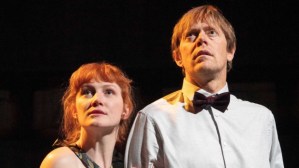Farewell Mister Haffmann at Ustinov Studio, Bath – review
Jean-Phillipe Daguerre’s historical play heads across the Channel for a new production in Bath

For a while, the Ustinov Studio was the UK home of French maestro Florian Zeller whose The Father, the English premiere originating in Bath, went on to become a monster hit with West End, Broadway, and Oscar garlanded film hits to boot. So, it’s pleasing to see another French import makes its way to the studio space with magic vision, and with a work that entertains throughout its twisting turning narrative.
In truth, Jean-Phillipe Daguerre’s Farewell Mister Haffmann, in this English translation by Jeremy Sams is a play of two distinct halves. The first charts the pact between two men in Nazi-occupied France; Nigel Lindsay’s Jewish jeweller Joseph Haffmann and Ciaràn Owens Pierre; who come to a mutual agreement; that Pierre and his wife Isabelle will move into Haffmann’s house and protect him by hiding him in the cellar, while Haffmann will father a child for the couple who are unable to produce one of their own. For an hour it is a three-hander of awkward tension, unexplored pain, and comic swipes, as the pregnancy plan fails to come together, and Owen’s Pierre, who leaves the house during the planned rendezvous for a tap-dancing class begins to move like Fred Astaire. Though the action is diverting enough, the jokes drawing chuckles in the way the likes of Not Going Out produce, it is also similarly a bit empty, the characters sketches; the dignified shop owner missing his family, the desperate to be pregnant Isabelle, the gradually going mad with jealousy Pierre. It could be an Ayckbourn comedy of despair but without the depth to truly feel like in the best of his works.
And then suddenly it switches, and the last half hour leaves you forgetting to breathe through the tension it elicits. The change is brought about by the arrival of Alexander Hanson’s Otto Abetz – the German ambassador to Vichy France – and his wife Suzanne for a dinner party at the Vigneau’s, one where Joseph Haffmann also attends pretending to be Pierre’s cousin. As the party progresses through the three courses, the energy shifts as revelations are made and we are unsure of exactly who knows what and who will turn on whom. There hasn’t been a finer dinner party scene since the slap that rocked the country in Doctor Foster.
Farewell Mister Haffmann is improved by its terrific quintet of performances which define underwritten parts. As the titular Haffmann, Lindsay produces another highly defined turn as the dignified Jewish jeweler who finds his cultivated life turned upside down. So often an explosive presence on stage and screen, here he finds a stillness equally powerful, his shoulders hunch, his eyes watering as he feels the emptiness of his solitary life. Equally terrific is Lisa Dillon as Isabelle, who lets us see all the complexities of a woman in love with her husband, but in desperate need of a child and fearing the insidious arrival of Nazi power in her home. Meanwhile, Owen etches his face into jealous twitches as his best-laid plans for a family start to fall apart and demonstrates a few soft shoe shuffles to good effect. Hanson is an all-terrifying charm as the Nazi commander, while Josefina Gabriella steals the whole thing as his vulgarian wife, throwing crude jokes around and producing a masterclass in wine-swilling.
Director Lindsay Posner is a terrific director of actors and after Who’s Afraid of Virginia Woolf? earlier this year, he has managed to bring to the Usti another set of great performances, but he doesn’t get to grips with how to stage the montage like scenes that Daguerre has written. Blackouts as actors move props or shift places always have a whiff of schoolboy drama to them. It may not be a great piece of writing in the vein of Zeller’s family dramas, its lack of character depth ultimately stops that, but Daguerre knows how to create tension within a comic tenor, and the actors provide the spark for a cracking night’s theatre.















